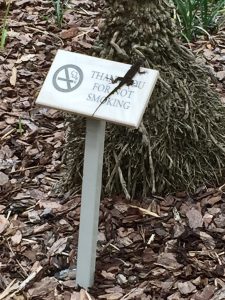Rising Above the Rudist Colony
In the mid-1980s, American comedian Rich Hall coined the word “sniglet” to define a word that does not appear in the dictionary but should. He published a series of books full of words we need but do not have in English. For example, a doork is a person who pushes on a door marked “pull” and pupkus is the moist residue left on a window after a dog presses its nose to it.
Occasionally, I accidentally create a sniglet, either because I cannot think of an adequate word to describe something or because the appropriate word I am searching for has slipped my mind. During a recent drive, I abruptly devised an innovative word after uttering an angry groan. A rudist is a person who does not comprehend the meaning of yield or who cuts you off in traffic.
Normally I would cry out “How Rude!” in a Stephanie Tanner-kind-of way, but this time I resorted to name-calling. Fortunately, fabricating a word made me smile and allowed me to continue driving without angst. Then I began thinking about distinct types of rudists other than ill-mannered drivers.
There are dog-walking rudists who do not scoop up after their canines. Unfortunately, there are parking rudists who do not need handicapped spots or who hog two allotted spaces. It is also unpleasant to encounter rudists who ignore signs that forbid smoking or littering.
Social rudists purposely lower their voices in front of others to gossip. A pet peeve of mine is when passers-by use “How are you doing?” as a casual greeting when it is obvious they do not have time to listen to my answer. These are acquaintance rudists who should more accurately say “hello,” nod, or smile.
Rudists are not always intentionally impolite or impudent. Sometimes they forget to think about what may hurt or annoy others or they have Inconsiderate Syndrome. (Note how I am also inclined to confirm new personality disorders, as well as common vocabulary.)
Hence, I redefine rudist to include all thoughtless persons. I am surprised it is not already part of our English language, but to be sure, I looked it up. It turns out that while I may have fashioned a new definition, such a noun does exist.
According to my research, a rudist is a cone-shaped, extinct mollusk that formed colonies resembling reefs during the Cretaceous period that ended over 66 million years ago. While these invertebrates have disappeared, plenty of my kind of rudists still walk around, some of us with primitive backbones. Indeed, those who know me well can name times that I am a rudist.
As I contemplate the consequences of unkindness and discourtesy, I promise to make a greater effort to restrain myself from being inconsiderate. For starters, I will try not to eat the last brownie without asking if anyone else wants it and I will make more of an effort to close doors, drawers, and cabinets. When shopping, I need to become more aware of my surroundings, so as not to inconvenience others with my stalled cart.
During conversations, I pledge to practice setting my phone down to show the person I am with that they are more important to me than my new text or email. I will try to listen more attentively instead of planning how best to share my point of view. Sometimes silence is golden and speaking fewer words can have a silver impact.
Millions of years ago, reefs were built by rudist clams. Though different looking, the coral reefs of our time still protect coastlines from storms and erosion. To protect goodwill and prevent charity from eroding, I promise to rise above the rudist colony forming in the reef below my human nature and to shine from sea to shining sea with grace.

